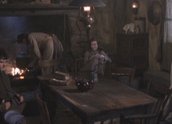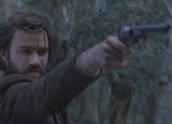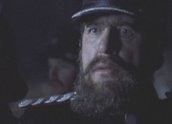


Ned Kelly (2003)
Synopsis
Edward (‘Ned’) Kelly (Heath Ledger) defends himself in a fight against police in the main street of Greta, after one officer wrongfully accuses him of stealing a horse. Kelly gets three years in prison. Returning to the family farm in north-east Victoria, he knuckles down to manual labour, but the police continue to harass the large Kelly family, headed by matriarch Ellen (Kris McQuade). Constable Fitzpatrick (Kiri Paramore) makes advances towards Ned’s sister Kate (Kerry Condon). Ned’s brother Dan (Laurence Kinlan) and friend Joe Byrne (Orlando Bloom) send him home bloodied, so Fitzpatrick fabricates a story that Ned shot him. Ned’s excuse, that he was in the arms of Julia Cook (Naomi Watts), the English wife of a local landowner, will not work, because she refuses to admit that to police. Ned, Dan, Joe and family friend Steve Hart (Philip Barantini) take to the bush to hide out.
At Stringybark Creek, Ned kills three policemen who refuse to down their weapons. The Kelly Gang is declared the colony’s most wanted, and a new law allows anyone to shoot them on sight. The police arrest Ellen Kelly and many of the men of the district. The gang then robs banks at Euroa and Jerilderie in NSW, humiliating their pursuers and sending a letter of demands to the Victorian Premier, Graham Berry (Charles 'Bud’ Tingwell). The Kellys distribute some of their takings and are treated as heroes in the small towns and villages. Berry appoints a tough policeman, Superintendent Hare (Geoffrey Rush), to hunt them down. Hare persuades their friend Aaron Sherritt (Joel Edgerton) to turn informer. The gang almost starve to death hiding out in the mountains, so Ned hatches a plan for a showdown. He will lure the police to an ambush at Glenrowan, and derail their train. The plan fails when a local teacher warns the train. The four gang members don their new handmade armour, to shoot it out with over 100 police. Steve, Dan and Joe die in the hotel, but Ned survives, severely wounded. He is taken back to Melbourne for trial, where he will be hanged in 1880.
Curator’s notes
Ned Kelly continues to cast a long shadow over Australian cinema. He was the subject of Australia’s first feature film in 1906 (see The Story of the Kelly Gang) and he has inspired new treatments of the story in most of the decades since. In almost all, Ned is treated as a folk hero, wrongfully accused by corrupt and vicious Victorian police, a man driven only by the desire to protect and defend his family and himself. That is also true of this version, based on the novel Our Sunshine (1991) by Robert Drewe, and directed by Gregor Jordan, who had by 2003 made two features (Two Hands, 1999, and Buffalo Soldiers, 2001).
Drewe invented a romantic subplot in which Ned is both lover and fighter, but he was hardly the first writer to imagine a love life for Ned Kelly. In the 1970 feature film Ned Kelly, directed by Tony Richardson, Mick Jagger as Ned had a girlfriend with him while fugitive in the bush. There is no evidence for either interpretation, but every film about Ned Kelly interprets the facts for its own times. British director Richardson portrayed Ned as a budding revolutionary intent on declaring a republic of north-east Victoria – an idea developed by Ian Jones, a Kennedy scholar who is credited as co-writer of that film’s screenplay. Jones later wrote an authoritive biography, Ned Kelly – A Short Life (1995, Hachette).
Jones argues that Kelly was influenced by political events in his own time – notably the Eureka Stockade uprising in the year of his birth – and Irish dreams of liberation from British rule. Ned and Joe Byrne wrote a Declaration of the Republic of North-East Victoria which ends ‘my orders must be obeyed’. In the late 1960s, these ideas found a sympathetic hearing with director Tony Richardson, who was part of a turbulent cultural and political scene in Britain. Paris had burned in 1968 in youth riots, as had parts of America after the assassinations of Robert Kennedy and Martin Luther King. Mick Jagger was a glamorous outlaw of the English cultural scene, a symbol of youthful resistance, hence his casting – or miscasting, depending on one’s view of his performance.
The 2003 Ned Kelly offers less of the revolutionary but more of the kind of folk hero who would appeal to Australian audiences raised on the legend, and American audiences missing the western genre. With Heath Ledger in the lead, Ned is handsome, romantic, poetic, fair-minded and fearless. The landscape of north-east Victoria is photographed to seem dark, cold and forbidding – almost as if it was shot in Ireland. That makes the argument that these men were barely Australian. Ned and his brother Dan speak in Irish accents, even though they were born in Victoria. The theory is that the Australian accent was not yet fully formed; these men therefore spoke the brogue of their Irish-born father, ‘Red’ Kelly. The screenwriter for this version is also the son of Irish parents – John Michael McDonagh grew up mostly in London, where he is said to have watched a lot of Australian television soaps with his brother Martin (a celebrated playwright and filmmaker himself).
Heath Ledger’s Ned is more Robin Hood than Che Guevara. His Ned has been raised on stories of ancient injustice in the old country. He recognises the Victorian police as the inheritors of the role of oppressor of the poor. He does not seek the mantle of freedom fighter, but the events of Stringybark Creek leave him no option. The actions of the black-hearted police, driven by lust, power and drink, force a spirited young man to become an outlaw, although he robs from the banks to support his sympathisers and friends, as they are arrested and hounded by the police.
Although Jordan’s film is probably the best adaptation yet, in a dramatic sense, it’s fair to say that none of the films about Ned Kelly has quite done justice to his story, at least in a way that explains his enduring hold on the Australian public. That may be because none of them has really been able to avoid the romantic mythology that surrounds him. That had begun even before he was hanged – in books, plays and illustrated magazines. It continues to this day. The story template of the romantic outlaw certainly predates his birth, but the Kelly version of the ‘wronged outlaw’ continues to influence many Australian films. Animal Kingdom (2010), although inspired by a completely different true story, follows almost the same trajectory. The cops kill one of theirs, they kill two cops, and the cops come after them – two vicious outfits gunning for each other in the streets of Melbourne, rather than Glenrowan. What makes Animal Kingdom so powerful is that the habitually criminal family at the centre of the story is not mythologised. They are bad to the bone, just like the police. No-one has yet dared to see the Kellys as much more than victims, which tends to rob them of a fully human dimension.
Gregor Jordan’s version at least concedes that they are familiar with the techniques of stealing horses and rebranding livestock, but essentially they remain wild colonial boys fighting for their rights. Jordan’s vision is picturesque, folkloric and dramatically stylised. It was criticised for its departures from the true story – not that there is much agreement about what that is – but Jordan was clear at the time about his motivations. The film, he said, stuck to the facts as closely as possible until the needs of dramatic filmmaking took precedence. The addition of Naomi Watts as a sort of love interest is an example of the latter. We know little about Ned Kelly’s love life, if he even had one.
Heath Ledger’s performance is sturdy, rather than stirring. He’s never quite comfortable with the accent, nor some of the speechifying in John Michael McDonagh’s wordy script. But he is imposing and attractive as Ned, with a touch of humour and a strong conscience. In a sense, the film’s most dramatic scene is not the shootout at Glenrowan, but the fight at Stringybark Creek, which goes completely out of control (see clip two). The anguish in Ned’s eyes when he has to kill the third policeman at close quarters, to end his suffering, is perhaps Ledger’s finest moment in the film.
Ned Kelly was released in Australian cinemas on 27 March 2003. It was nominated for nine AFI Awards in 2003: Best Actor (Heath Ledger), Supporting Actor (Orlando Bloom), Director, Adapted Screenplay, Cinematography (Oliver Stapleton), Editing (Jon Gregory) and Sound (Gary Wilkins, Colin Miller, Adrian Rhodes and Chris Burden), winning awards for Costume Design (Anna Borghesi) and Production Design (Steven Jones-Evans).
- Overview
- Curator’s notes
- Video 3 clips
- Principal credits
- Find a copy
- Comments 1
- Map
- Add your review



